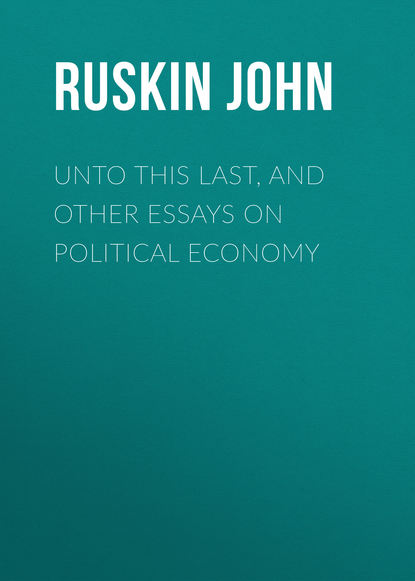 Полная версия
Полная версияUnto This Last, and Other Essays on Political Economy
120
Compare Chaucer's feeling respecting birds (from Canace's falcon, to the nightingale, singing "Domine labia "—to the Lord of Love) with the usual modern British sentiments on this subject. Or even Cowley's:—
"What prince's choir of music can excelThat which within this shade does dwell.To which we nothing pay, or give,They, like all other poets, liveWithout reward, or thanks for their obliging pains!'Tis well if they became not prey."Yes; it is better than well; particularly since the seed sown by the wayside has been protected by the peculiar appropriation of part of the church rates in our country parishes. See the remonstrance from a "Country Parson," in the Times of June 4th (or 5th; the letter is dated June 3rd, 1862):—"I have heard at a vestry meeting a good deal of higgling over a few shillings' outlay in cleaning the church; but I have never heard any dissatisfaction expressed on account of the part of the rate which is invested in fifty or 100 dozens of birds' heads."
121
καὶ πενίαν ἡγουμένους εἷναι μὴ τὸ τὴν οὐσίαν ἐλάττω ποιεῖν, ἀλλὰ τὸ τήν ἀπληστίαν πλείω.—"Laws," v. 8.
Read the context and compare. "He who spends for all that is noble, and gains by nothing but what is just, will hardly be notably wealthy, or distressfully poor."—"Laws," v. 42.
122
The fury of modern trade arises chiefly out of the possibility of making sudden fortune by largeness of transaction, and accident of discovery or contrivance. I have no doubt that the final interest of every nation is to check the action of these commercial lotteries. But speculation absolute, unconnected with commercial effort, is an unmitigated evil in a state, and the root of countless evils beside.
123
It is especially necessary that the reader should keep his mind fixed on the methods of consumption and destruction, as the true sources of national poverty. Men are apt to watch rather the exchanges in a state than its damages; but the exchanges are only of importance so far as they bring about these last. A large number of the purchases made by the richer classes are mere forms of interchange of unused property, wholly without effect on national prosperity. It matters nothing to the state, whether if a china pipkin be rated as worth a hundred pounds, A has the pipkin, and B the pounds, or A the pounds and B the pipkin. But if the pipkin is pretty, and A or B breaks it, there is national loss; not otherwise. So again, when the loss has really taken place, no shifting of the shoulders that bear it will do away with the fact of it. There is an intensely ludicrous notion in the public mind respecting the abolishment of debt by denying it. When a debt is denied, the lender loses instead of the borrower, that is all; the loss is precisely, accurately, everlastingly the same. The Americans borrow money to spend in blowing up their own houses. They deny their debt; by one third already, gold being at fifty premium; and will probably deny it wholly. That merely means that the holders of the notes are to be the losers instead of the issuers. The quantity of loss is precisely equal, and irrevocable; it is the quantity of human industry spent in explosion, plus the quantity of goods exploded. Honour only decides who shall pay the sum lost, not whether it is to be paid or not. Paid it must be and to the uttermost farthing.



